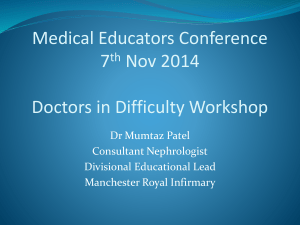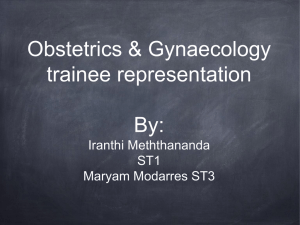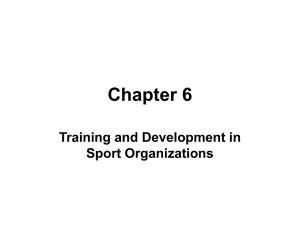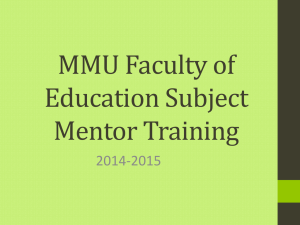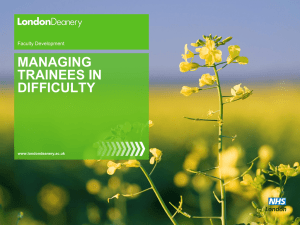Trainee Advisory Committee Meeting Minutes
advertisement
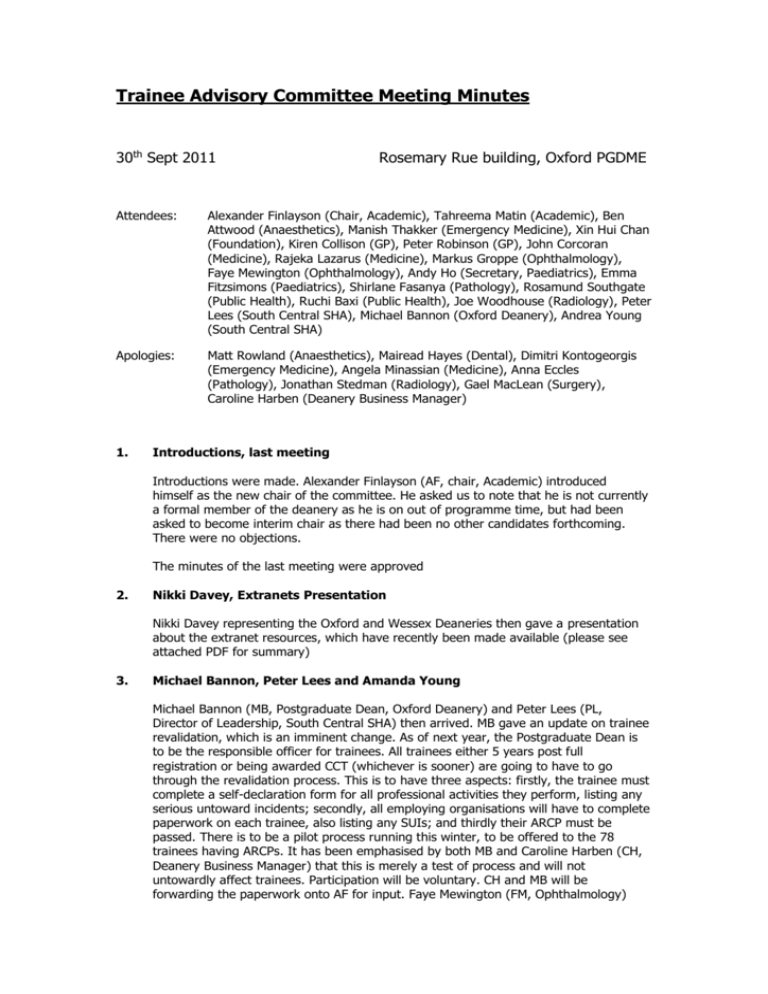
Trainee Advisory Committee Meeting Minutes 30th Sept 2011 Rosemary Rue building, Oxford PGDME Attendees: Alexander Finlayson (Chair, Academic), Tahreema Matin (Academic), Ben Attwood (Anaesthetics), Manish Thakker (Emergency Medicine), Xin Hui Chan (Foundation), Kiren Collison (GP), Peter Robinson (GP), John Corcoran (Medicine), Rajeka Lazarus (Medicine), Markus Groppe (Ophthalmology), Faye Mewington (Ophthalmology), Andy Ho (Secretary, Paediatrics), Emma Fitzsimons (Paediatrics), Shirlane Fasanya (Pathology), Rosamund Southgate (Public Health), Ruchi Baxi (Public Health), Joe Woodhouse (Radiology), Peter Lees (South Central SHA), Michael Bannon (Oxford Deanery), Andrea Young (South Central SHA) Apologies: Matt Rowland (Anaesthetics), Mairead Hayes (Dental), Dimitri Kontogeorgis (Emergency Medicine), Angela Minassian (Medicine), Anna Eccles (Pathology), Jonathan Stedman (Radiology), Gael MacLean (Surgery), Caroline Harben (Deanery Business Manager) 1. Introductions, last meeting Introductions were made. Alexander Finlayson (AF, chair, Academic) introduced himself as the new chair of the committee. He asked us to note that he is not currently a formal member of the deanery as he is on out of programme time, but had been asked to become interim chair as there had been no other candidates forthcoming. There were no objections. The minutes of the last meeting were approved 2. Nikki Davey, Extranets Presentation Nikki Davey representing the Oxford and Wessex Deaneries then gave a presentation about the extranet resources, which have recently been made available (please see attached PDF for summary) 3. Michael Bannon, Peter Lees and Amanda Young Michael Bannon (MB, Postgraduate Dean, Oxford Deanery) and Peter Lees (PL, Director of Leadership, South Central SHA) then arrived. MB gave an update on trainee revalidation, which is an imminent change. As of next year, the Postgraduate Dean is to be the responsible officer for trainees. All trainees either 5 years post full registration or being awarded CCT (whichever is sooner) are going to have to go through the revalidation process. This is to have three aspects: firstly, the trainee must complete a self-declaration form for all professional activities they perform, listing any serious untoward incidents; secondly, all employing organisations will have to complete paperwork on each trainee, also listing any SUIs; and thirdly their ARCP must be passed. There is to be a pilot process running this winter, to be offered to the 78 trainees having ARCPs. It has been emphasised by both MB and Caroline Harben (CH, Deanery Business Manager) that this is merely a test of process and will not untowardly affect trainees. Participation will be voluntary. CH and MB will be forwarding the paperwork onto AF for input. Faye Mewington (FM, Ophthalmology) then asked about the involvement of trusts; MB replied that they have all been briefed on the process, and all the HoS signed up. MB and PL then informed us that this is a process requiring trainees as medical professionals to demonstrate we are safe to practice. The philosophy, processes and appeals structures are still being developed. AF then asked about trainee representation, and MB asked for volunteers. Tahreema Matin (TM, Academic), Ben Attwood (BA, Anaesthetics) and AF offered to help. MB then noted a letter from Andrew Lansley recently published in the Times which stated that Deaneries are to continue to exist. Andrea Young (AY, COO of the South Central SHA), then arrived. MB left. BA then spoke of his impression of a lack of cohesion amongst the medical specialties. He contrasted this against the workings of the GP community who came together to present a unified argument to the government leading to the new GP contract. PL agreed that this was a problem with several groups having competing interests and a lack of overall leadership. However, he suggested that there have been several examples of trainees managing to bring issues up through the levels of seniority to lead to service improvements. AF suggested that this was merely exceptional incident reporting, but the grassroots discontent amongst junior medical staff was being ignored. MB and PL suggested this often runs throughout multidisciplinary teams, and suggested it may link in with wider issues; PL noted that prior to the Mid Staffordshire Hospital problems it had been noted that trainees rarely wanted to work at the hospital and he wondered if this had been reflected in the GMC annual surveys. AY reported that she had not realised how deep seated discontent was felt amongst the junior doctors. She also reported the general feeling that the DoH were led by public interests whereas the junior doctors were less so. Xin Hui Chan (XC, Foundation) then expressed concerns about the poor experiences of the Foundation doctors, especially at the John Radcliffe. In this setting, they have great transience in their jobs and are often moved into menial tasks, with little opportunity to learn as nurse specialists are doing tasks previously performed by junior doctors. PL accepted the requirement for training, but reminded the group that the reasons behind these decisions included increased safety for patients because of improved staff permanence. PL encouraged us to be more cohesive as a voice, “learn to be effective, not right”, and again echoed his offers to support us in these aims. XC then told us about her team efforts in improving the lot of the junior doctors at the JRH. Along with Dr Sullivan (DME, JRH), they have instituted trainee led forums and surveys which they are using to effect change. Her efforts were praised by the group and PL reiterated his previous offers to the group of training to support us in our work. BA then commented that there are several barriers to trainee action. Firstly, that most of us have had the Remedy UK campaign during the MTAS problems as an example of mass junior doctor objection failing to achieve change despite huge involvement. He also feels that the views of junior doctors are often ignored and also the requirement of a reference from one’s last consultant can often be a barrier to speaking up. FM suggested polling as a method to measure discontent, but conceded that short times spent in positions is often a problem in this. AF suggested deciding what issues to survey in itself is unclear. Rosamund Southgate (RS, Public Health) reminded the group about mess committees, which can often be useful vehicles locally, but variable in their effectiveness between trusts. JW asked if last consultant references could be disassociated from job applications- both PL and AY felt this was likely to be impossible and would pose questions about the nature of an applicant. AF then raised the topic of clinical leadership. He has recently attended a conference in which the relationship of innovation vehicles and leadership was discussed. PL suggested that improvements in clinical leadership can improve outcomes and then spoke about the availability of two local fellow positions in clinical leadership. AY then spoke about the imminent changes in the NHS since the end of the listening exercise. She told us that GP commissioning has become clinician commissioning and that there has been a distinct emphasis on the changes not being about competition. There is a distinct political will for change. The new consortia are expected to be selfgoverning, autonomous organisations allowing local decision making. The pace of change is likely to be accelerating over the coming months with commissioning groups to be authorised and money signed over next autumn. Current staff in place will be working alongside the new consortia initially to ensure they do not fail. There are still many questions to be answered, including decisions on outcomes for a failing Foundation trust. The feeling is that, given the financial state, change is inevitable. Kiren Collinson (KC, GP) then asked how GP consortia not formally trained in management or finance could be expected to run commissioning services and how this will affect clinical duties. AY suggested that the changes were an opportunity to bring our clinical needs forward. PL noted that regarding the other skills sets required to commission, consortia will have financial specialists on board who can take over that job, and clinical members of the group need only have comparatively simple understandings. The analogy used was that a neurosurgeon needs an anasthetic but does not necessarily know how to induce anaesthesia. 4. Contacting trainees At the inception of Oxford’s Trainee Advisory Committee, it was observed that there is no comprehensive or reliable method of contacting trainees. This has been a regular topic of discussion in the forum with no simple solution. JW is keen to try to start collecting email addresses from the HoS/TPDs along with grade and current hospital. He has already set up a suitable gmail account for use. A discussion then ensued about applicability of the Data Protection Act, although JW felt that this was not relevant, as the data being held was not sensitive. An alternative suggestion of the committee members being a system through which important information could be disseminated was also suggested. JC then suggested that the TPDs are rarely up to date with which trainees are under their charge and are unlikely to be an up to date source of trainees. He then suggested we use the extranets as a way to collate details, but BA suggested that given trainees already have multiple profiles across several sites, both professional and personal, that this was an unattractive option. It was then suggested we set up a subscribe list on the trainee website. This could be potentially allied with an offer to send updates to disseminate information. Tahreema Matin (TM, Academic) then suggested that this should not be an issue for the TAC to sort out, but that the Deanery should be dealing with this issue. AH then reported that these issues around contacting trainees was also a problem that Caroline Harben wanted to speak to us about, as trainees need to inform the hospitals they are employed at, as well as the deanery and their relevant school when they move house. 6. Expenses The issue of expenses claims for travel and removals has been discussed previously in this forum. The issue initially was around non-payment for on call rooms by the JRH when trainees were classed as nonresident on call; this has been dealt with. Subsequently, however, it has become apparent that the ENT and Ophthalmology teams, in particular have concerns about the amounts claimable because of split site working on calls. They are finding that they are rapidly using up their £8,000 allowance and then the costs for travel are extensive. AH recalled that Robert Purbrick had made enquiries about this and had been exploring options with the BMA. FM and Markus Groppe (MG, Ophthalmology) will speak to Rob for an update. BA then suggested that awareness about the amounts claimable and processes within the region were very poor and asked if summaries could be posted onto the internet on the trainee website. It was agreed by the team that this was a good idea and AH will prepare the relevant documents. 7. AoB Steffan Hinze (SH) then attended to speak about the new Medical Education Fellowships. These are new to the Oxford region and are based quite extensively on the Wessex model. They are hoping for applicants from ST3 and above who have a project in mind to deliver improved education for trainees. It is intended to be traineedriven. Unfortunately trainees will only be allowed time to pursue this on a discretionary basis by the TPD and employing trust. RS asked if the Wessex trainees are working to the same model; SH replied that it seems to work well there and trainees are being released. He also clarified that the posts were unfunded. AH asked for examples of projects done by the Wessex trainees and SH told us that the GPs have produced a significant amount of training materials in use for the group and also improvements in educational supervision. SH is keen for the TAC to disseminate information about this to our respective specialities. The TAC Terms of Reference were then discussed. AH summarised the problem as trainee representatives acquiring positions of chair, deputy chair or secretary still only functioning within their original two year terms. This could lead to someone only being in post for a handful of months. It was suggested that we allow a year extension to those acquiring a position of responsibility within the group. This was voted upon and all present were in agreement. The possibility of second terms of office as representative was then discussed. We voted on an amendment to the ToR allowing a second term as long as the incumberant was re-elected by appropriate means. AH will draft changes. Date of next meeting Friday 2nd December, Teaching Rooms, Rosemary Rue Building, Oxford Deanery. Subsequent meeting dates: 2/3/12, 1/6/12, 28/9/12 and 7/12/12.
